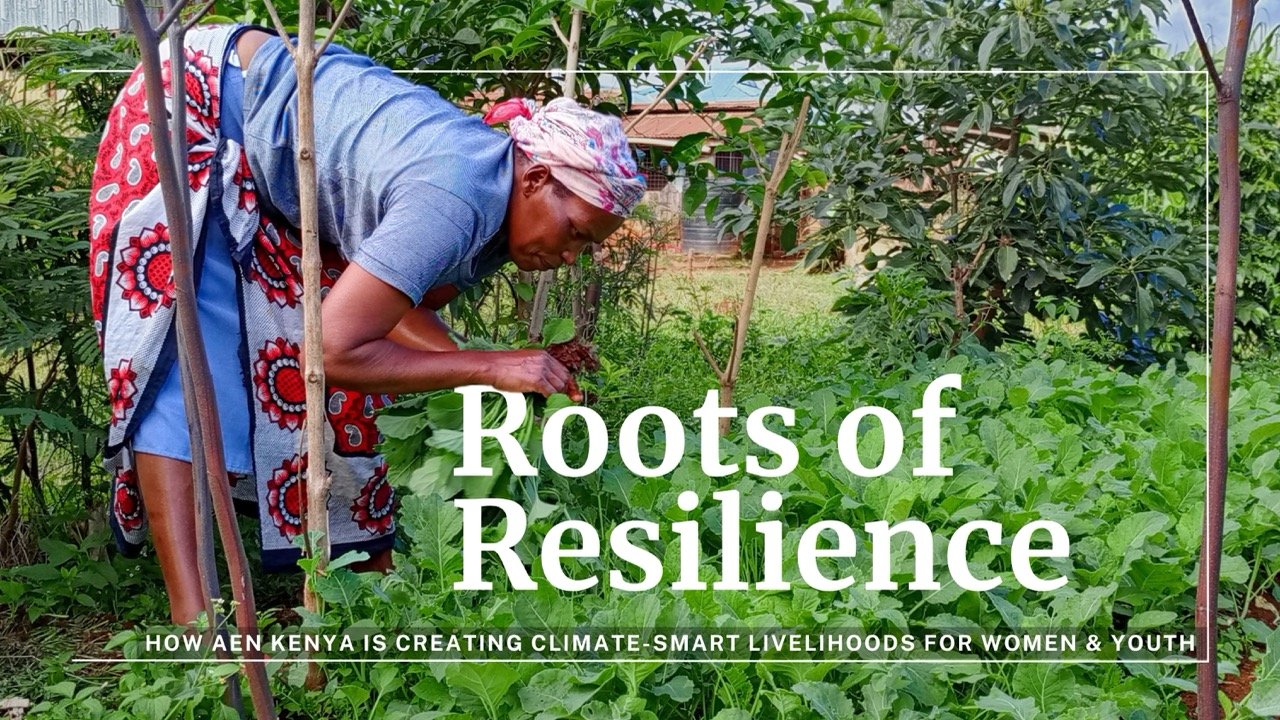Roots of Resilience: How AEN Kenya’s Agroforestry Program is Creating Climate-Smart Livelihoods for Women & Youth
Kenyan women play a crucial role in the workforce, with an over 72% labor participation rate. Yet, nearly 69% work in unstable, low-paying jobs like subsistence farming and informal labour—underscoring the urgent need for empowering economic and sustainable opportunities.
Agritech Empowerment Network (AEN) - Kenya is a not-for-profit tackling climate change and driving sustainable development through environmental conservation and regenerative agriculture. Founded by Maureen Nyonji, AEN focuses on women and youth, equipping them with the tools to build climate-resilient livelihoods.
Take the story of Joyce, a smallholder farmer in Ikinu village, Kiambu county, Central Kenya. She once struggled with poor harvests, dwindling income, and an uncertain future. Through AEN Kenya’s agroforestry initiative, she turned her land into a thriving food forest—securing her livelihood and inspiring other women to do the same.
Joyce’s Reality – A Microcosm of Rural Kenya’s Challenges
In Kenya, farmers are grappling with critical challenges like unsustainable agricultural practices, scarce resources, and the worsening effects of climate change. Joyce, a farmer and mother, was no exception. Financial constraints and a lack of technical knowledge kept her farm yields low for many years, threatening her family’s food security and income. The unpredictability of weather patterns and a degrading soil quality further deepened her vulnerabilities.
Through community engagement, field assessments, data collection, and consultations with stakeholders and agri-experts, AEN Kenya identified four core issues affecting farmers like Joyce:
Reliance on conventional, degenerative farming due to limited knowledge of sustainable agriculture.
Unpredictable rainfall and extreme climate events, worsened by low adoption of climate-smart solutions.
Lack of awareness of organic farming and composting, increasing dependence on chemical fertilisers.
Severe deforestation, driven by high fuelwood consumption and land clearing without reforestation methods like agroforestry or tree nurseries.
Climate & Community-Aligned Solutions
To address these challenges, AEN-Kenya designed targeted interventions focused on regenerative agriculture, climate-smart practices, and environmental restoration.
Through workshops and hands-on training, women and youth learn sustainable farming techniques that improve soil health and conserve water. They are introduced to drought-resistant crops and agroforestry species that strengthen climate resilience, as well as organic farming and composting methods to reduce reliance on chemical fertilisers. By establishing agroforestry systems and community-run tree nurseries, AEN-Kenya is also restoring degraded land while creating new income opportunities for farmers.
Joyce, for instance, learned seed collection, propagation, tree care, and value addition, along with receiving seedlings to kickstart her efforts. Beyond technical skills, AEN-Kenya connected her to market opportunities through networking events and agri-fairs, enabling her to sell seedlings, honey, vegetables, and other agroforestry products—diversifying and strengthening her income.
AEN-Kenya’s impact extends beyond individual farmers. The organisation fosters community support through cooperatives and women’s groups, providing access to peer learning, shared nurseries, composting hubs, and microfinance. Monthly field visits, mentorship, and data-driven program refinement ensure that farmers continue to adopt and refine climate-smart practices. Additionally, AEN-Kenya collaborates with policymakers, advocating for policies that support women and youth in sustainable agriculture, land rights, financial inclusion, and climate adaptation.
Driving Tangible Impact Through Sustainability
AEN-Kenya's holistic approach to regenerative agriculture has yielded profound positive impacts. Over 2,000 women and youth have been trained in sustainable agriculture and nursery management, allowing them to diversify their incomes through tree nurseries and organic produce sales. Many have joined women’s savings groups, gaining access to credit and financial stability.
To date, 500,000 agroforestry trees have been planted, revitalising Central Kenya’s landscapes, improving soil health, and fostering biodiversity. Farmers are integrating mulching, rainwater harvesting, and sustainable land management techniques, strengthening their resilience to climate shocks.
Farmer groups have become vital hubs for knowledge-sharing and mentorship, community nurseries serve as training centers, and women are now leaders in farming groups and policy advocacy, gaining recognition at national forums. These interventions, spearheaded by AEN-Kenya, have empowered women and youth, catalysing both economic growth and environmental restoration.
As for Joyce, her journey from struggling farmer to thriving agroforestry practitioner has been transformative. Through AEN-Kenya’s support, she has restored soil fertility on her land, improved farm productivity, and diversified her income by selling agroforestry products, fodder trees, honey, and organic produce within her community. Her newfound financial stability not only sustains her household but also funds her children’s education, ensuring a brighter future for the next generation.
But Joyce’s story doesn’t end with her own success. She has become a leader in her village, training other women farmers in sustainable practices that enhance soil health, conserve water, and reduce dependency on expensive chemical fertilisers. Drawing from her experience, she teaches them how to establish their own tree nurseries, integrate agroforestry techniques, and leverage local markets to generate steady incomes.
Scaling the Impact: What’s Next for AEN-Kenya
AEN-Kenya's demonstrated leadership in promoting sustainable agriculture and the economic empowerment of women and youth has led to expanded partnerships, policy influence, and the potential for scaling its community-driven agroforestry model across Kenya. To build on this momentum, the organisation is focusing on:
Expanding its training programs to reach more women and youth
Increasing the number and diversity of tree nurseries
Strengthening market linkages for better economic opportunities
Enhancing impact assessment and advocacy efforts
Mobilising funding to support its long-term growth
As AEN-Kenya looks ahead, Joyce’s success is a powerful reminder of what happens when women gain access to knowledge, resources, and supportive networks—they not only transform their own lives but also uplift entire communities.
By investing in climate-smart agriculture and placing women and youth at the center of regenerative solutions, AEN-Kenya is addressing today’s challenges, while creating a resilient and sustainable future for generations to come.
This story is a part of the ‘Green Economies, Powered By Women’ campaign by SHE Changes Climate to spotlight women entrepreneurs driving climate solutions in Brazil, South Asia, and Africa.

